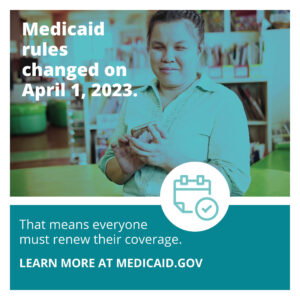OVER 6.4 MILLION HAVE LOST MEDICAID COVERAGE
As of September 14, over 6.4 million Medicaid enrollees have lost covered, according to data from the Kaiser Family Foundation. 36% of those who completed the renewal process were disenrolled and 10.8 million enrollees were able to qualify for renewed coverage. The large range of disenrollment rates in each state varies, with the highest of 69% being in Texas and the lowest of 9% in Michigan. Out of all states with available data, 72% of all those disenrolled were due to procedural reasons.
The Center on Budget and Policy Priorities (CBPP) continues to run their fall Beyond the Basics webinar series which provides training for assisters to prepare. The next webinar will be on September 19 and will discuss immigrant eligibility for health care programs. For a complete list of the dates and times for the entire webinar series, check out our news item which also has links for the slides and video recording of webinars which have been archived.
The American Association on Health and Disability and the Lakeshore Foundation joined the Rehabilitation Benefits (HAB) Coalition in supporting the Administration’s reduction in short-term, limited duration health insurance (STLDI) and focusing on the importance of rehabilitation and habitation services in terms of essential health benefits.
The Commonwealth Fund released an issue brief on the impact of the Medicaid coverage gap by comparing states that have and have not expanded eligibility. This issue brief found that those in expansion states experienced increased health insurance coverage and lower rates of avoiding seeking medical care, and greater use of preventative care.
The U.S. has the highest rate of maternal mortality of all developed nations, prompting some states to make policy innovations that will build state capacity for Medicaid-eligible pregnant people via the Supporting State Maternal and Child Health Policy Innovation Program. The National Academy for State Health Policy has highlighted each of the participating states’ (Idaho, Illinois, Iowa, Louisiana, Pennsylvania, South Dakota, and Virginia) achievements in providing health equity to maternal and child health.
The Georgetown University Center for Children and Families summarized the Center for Medicare and Medicaid Services postpartum care toolkit that aims to address access, quality, and equity of care for those who use Medicaid and CHIP. Strategies included were related to coverage continuity, support of home visiting programs, doulas, and community health workers, postpartum care improvement, and quality measurement improvement.
Colorado is one of the first states to utilize a quasi-public health insurance option which requires private health insurers to offer state plans that offer more affordable and higher quality choices. Requested rate increase for the Colorado Option plan are nearly 30% less compared to the non-Colorado Option plans, as reported by the CHIR Blog. This change is an example of how states can enhance rate review processes to decrease healthcare costs.
Unwinding the Medicaid continuous coverage requirement has begun in many states, and people have started losing their Medicaid eligibility. Over the last couple months, we have been updating our “Medicaid Unwinding Resources” blog post which has links to various resources including our Medicaid unwinding flyer.
Archives of our weekly updates are available on the NDNRC website.

